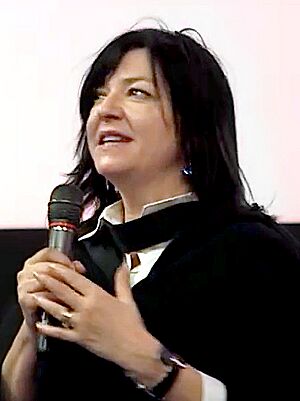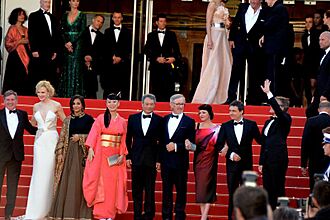Lynne Ramsay facts for kids
Quick facts for kids
Lynne Ramsay
|
|
|---|---|

Ramsay at ADIFF 2018
|
|
| Born | 5 December 1969 Glasgow, Scotland
|
| Nationality | Scottish |
| Alma mater | Napier College National Film and Television School |
| Occupation |
|
| Years active | 1995–present |
| Children | 1 |
| Awards | Full list |
Lynne Ramsay (born on December 5, 1969) is a talented Scottish filmmaker. She is known for directing and writing movies like Ratcatcher (1999), Morvern Callar (2002), We Need to Talk About Kevin (2011), and You Were Never Really Here (2017). Her latest film, Die My Love, was released in 2025.
Her films often explore themes like sadness, guilt, and what happens after someone passes away. She often focuses on children and young people in her stories. Instead of lots of talking, her movies use strong images, detailed scenes, music, and sounds to tell their stories.
Contents
Early Life and Education
Lynne Ramsay was born in Glasgow, Scotland, in 1969. Her parents loved movies and introduced her to films by famous directors like Alfred Hitchcock when she was young. She also found inspiration in the classic 1939 film The Wizard of Oz.
Photography and Film School
Lynne had a strong interest in photography from an early age. She studied fine art and photography at Napier College in Edinburgh. While there, she watched a film called Meshes of the Afternoon by Maya Deren. This film greatly inspired her and made her decide to apply to film school.
In 1995, she graduated from the National Film and Television School in Beaconsfield, England. There, she learned about cinematography (how to film movies) and direction (how to lead a film project).
Filmmaking Career
Early Short Films (1996–1998)
In 1996, Lynne Ramsay made her first short film, Small Deaths, as her graduation project. It showed three short stories about children dealing with family life and the results of their actions. Ramsay wrote, directed, and filmed it herself. This film won an award at the Cannes Film Festival. Later that year, she made Kill the Day, which explored themes of memory through the story of a person facing challenges after being released from jail.
Her short film Gasman (1998) was also written and directed by Ramsay. It tells the story of a brother and sister who meet other children at a Christmas party who seem to know their father in a strange way. This film also won an award at Cannes and was nominated for a BAFTA Award for Best Short Film.
First Feature Films (1999–2002)
Lynne Ramsay's short films impressed a producer from BBC Scotland, who asked her to develop a full-length movie. This led to her first feature film, Ratcatcher, released in 1999. The movie was set in Glasgow during a garbage collectors' strike in the 1970s and followed a young boy named James.
Ratcatcher was praised by critics and won the BAFTA Award for Outstanding Debut by a British Writer, Director, or Producer.
Her next film, Morvern Callar (2002), was based on a book. It followed a young girl (Samantha Morton) traveling in Europe after a big loss. The film explored how she dealt with her feelings. The movie's soundtrack featured music from artists like Aphex Twin and Boards of Canada. In 2022, the film was shown again at festivals, and Ramsay noted that younger audiences still connected with it.
Becoming an Established Director (2010–2019)
After a break, Ramsay returned in 2011 with We Need to Talk About Kevin. This film, based on a book, is about a mother (Tilda Swinton) dealing with the aftermath of a difficult event caused by her son (Ezra Miller). Ramsay directed and co-wrote the film. The music for the movie was created by Jonny Greenwood. The film was shown at the 2011 Cannes Film Festival and received great reviews, especially for Tilda Swinton's acting and Ramsay's direction.
In 2012, Ramsay directed the short film Swimmer, which won a BAFTA Award for Best Short Film in 2013. She was also chosen to be a judge at the 2013 Cannes Film Festival and the 2015 Venice Film Festival.
Her film You Were Never Really Here (2017) was based on a short book. It premiered at the 70th Cannes Film Festival and received a standing ovation. Ramsay won the Best Screenplay award for it. The movie stars Joaquin Phoenix as Joe, a war veteran who helps rescue young girls from dangerous situations. The film explores how past experiences affect the mind. This was her second time working with Jonny Greenwood on the music.
After You Were Never Really Here, Ramsay started working on new projects. In 2018, she mentioned writing a script for an "epic environmental horror" film. In 2020, it was announced she would direct a film based on Stephen King's book The Girl Who Loved Tom Gordon.
Recent Work (2020–Present)
In 2021, Ramsay shared that she was working on another movie with Joaquin Phoenix called Polaris, which also stars Rooney Mara. She described it as a story set in the Arctic.
In 2022, Ramsay announced a film adaptation of Margaret Atwood's Stone Mattress, starring Julianne Moore and Sandra Oh. She felt the story was very important, especially with current events.
In November 2022, it was announced that Ramsay would direct a film based on the novel Die, My Love. This film is produced by Martin Scorsese and Jennifer Lawrence, with Lawrence also starring. The story is about a woman dealing with challenges related to her marriage and childbirth. Ramsay mentioned the film would be funny. In July 2024, Robert Pattinson joined the cast, and in August 2024, LaKeith Stanfield, Sissy Spacek, and Nick Nolte also joined. The film began filming in Calgary and premiered at the 2025 Cannes Film Festival in competition for the main prize.
In 2024, it was reported that Ramsay was writing another script called Hierarchies. In May 2025, she announced she was working on a vampire film starring Ezra Miller, who is also helping to write the script.
Challenges in Film Projects
Lynne Ramsay has faced some challenges with film projects during her career.
The Lovely Bones
In 2001, Ramsay was set to direct the film adaptation of the book The Lovely Bones. She had read the book before it became very popular. As the book became a bestseller, there was more pressure on the film. Ramsay felt that people became too focused on making money from the project, wanting the film to be exactly like the book. Eventually, the company funding the film replaced her with director Peter Jackson in 2004. Ramsay described this as a difficult situation.
Losing The Lovely Bones project was tough for Ramsay. The next year was even harder as she lost both her father and a close friend, Liana Dognini, who had helped her write Morvern Callar.
Jane Got a Gun
In 2012, Ramsay was going to direct Jane Got a Gun, a movie about a farmer's wife who has to defend herself and her husband. Natalie Portman was set to star in the film. However, in March 2013, Ramsay left the project because she had different ideas from the producers about how the film should be made. She was replaced by another director.
A year after she left, a lawsuit related to the project was settled. During this time, Ramsay's marriage also ended. She then went to Santorini, Greece, where she started writing the script for her next film, You Were Never Really Here. She stayed in Santorini for four years and had her daughter there.
Personal Life
Lynne Ramsay was married to Rory Stewart Kinnear, who is a writer and musician. Her niece, Lynne Ramsay Jr., has appeared in some of her early short films.
Ramsay has one daughter. The actors Tilda Swinton and John C. Reilly, who starred in her film We Need to Talk About Kevin, are her daughter's godparents.
Influences and Reputation
Lynne Ramsay has been inspired by many artists and filmmakers. In 1999, she mentioned photographers like Nan Goldin and filmmakers like Terrence Malick and Andrei Tarkovsky as her mentors. She also found inspiration in Robert Bresson's book Notes on the Cinematographer. She has also been deeply moved by films like Rainer Werner Fassbinder's Fear Eats the Soul and David Lynch's Blue Velvet.
Ramsay's films often explore themes such as childhood, losing innocence, feeling alone, guilt, and memories. Many of her movies also deal with sadness and how people cope with it.
Film critics have praised Ramsay's work. Mark Olsen from the Los Angeles Times called her "one of the leading lights of young British cinema." The Harvard Film Archive described her as a filmmaker who uses images, textures, colors, music, and sound to create powerful and immersive movie experiences. British film critic Jonathan Romney noted that Ramsay thinks in images, making her films feel more like music than intellectual discussions.
In 2007, The Guardian newspaper listed Lynne Ramsay as one of the world's top 40 directors working at that time.
Filmography
Feature Films
| Year | Title | Director | Writer | Producer | Ref(s). |
|---|---|---|---|---|---|
| 1999 | Ratcatcher | Yes | Yes | No | |
| 2002 | Morvern Callar | Yes | Yes | No | |
| 2011 | We Need to Talk About Kevin | Yes | Yes | Executive | |
| 2017 | You Were Never Really Here | Yes | Yes | Yes | |
| 2025 | Die, My Love | Yes | Yes | No |
Short Films
| Year | Title | Director | Writer | Producer | DoP | Notes | Ref(s). |
|---|---|---|---|---|---|---|---|
| 1996 | Small Deaths | Yes | Yes | No | Yes | ||
| 1997 | Kill the Day | Yes | Yes | No | No | ||
| 1998 | Gasman | Yes | Yes | No | No | ||
| 2012 | Swimmer | Yes | No | Executive | No | ||
| 2019 | Brigitte | Yes | Yes | Yes | No | Documentary |
Awards and Recognition
On October 8, 2013, Lynne Ramsay received an honorary doctorate from the University of Edinburgh. This award recognized her important contributions to British film.
See also
 In Spanish: Lynne Ramsay para niños
In Spanish: Lynne Ramsay para niños
- Cinema of Scotland
- List of female film and television directors
- Women's cinema
 | Jewel Prestage |
 | Ella Baker |
 | Fannie Lou Hamer |


